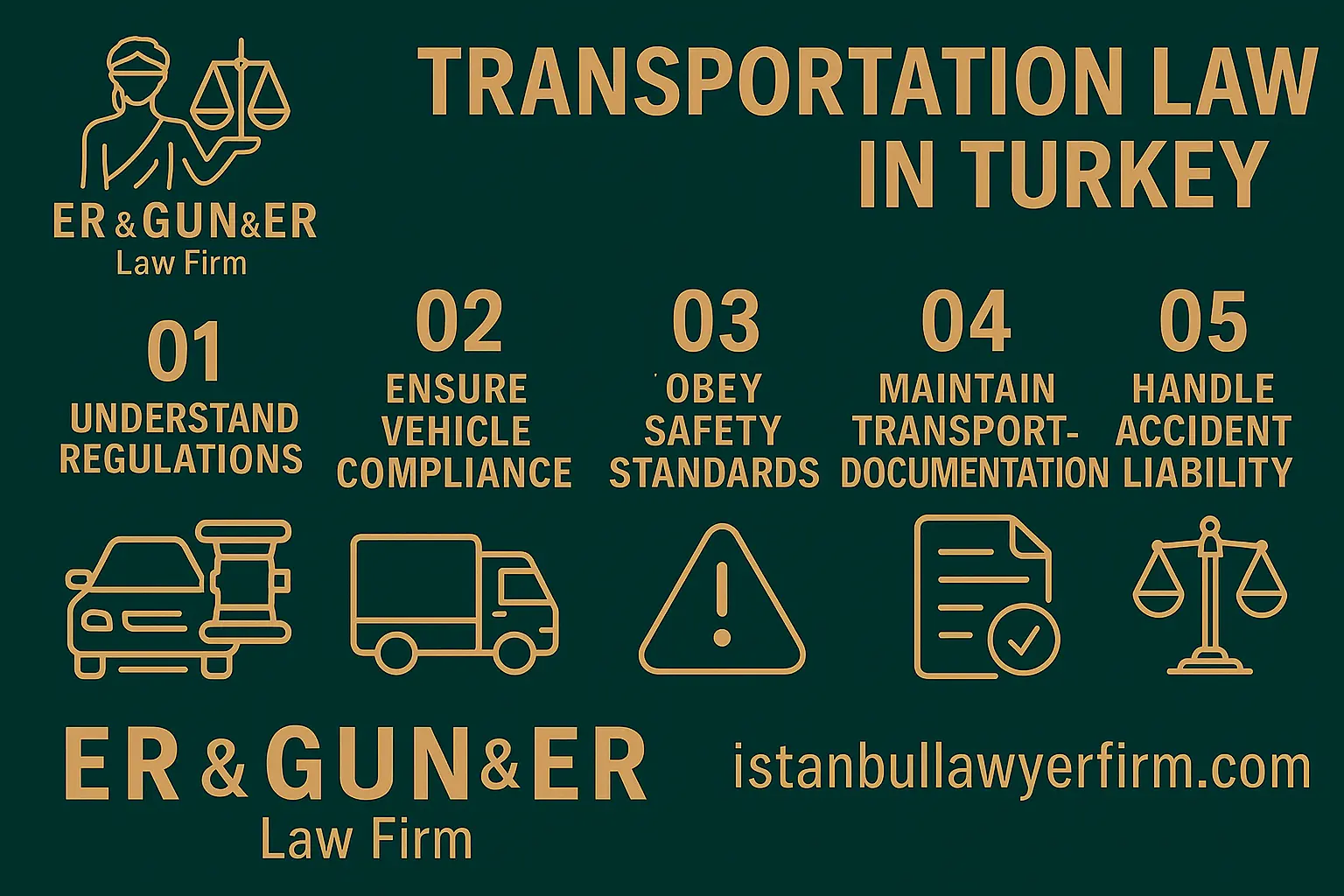
Transportation and logistics law in Turkey governs the carriage of goods by road, sea, air, and rail under a framework of national regulations, international conventions, and contractual terms. Issues involving freight damage, cargo loss, customs seizures, and multimodal logistics operations require precise legal handling to limit liability and recover damages. At Istanbul Law Firm, our experienced English speaking lawyers in Turkey represent shippers, carriers, freight forwarders, and insurers in all aspects of transportation law and logistics disputes.
Whether you’re negotiating a logistics contract, pursuing compensation for lost cargo, or navigating a customs violation, we provide fast, clear, and commercially driven legal support. Recognized as a best lawyer firm in Turkey for transport and commercial law, our team delivers actionable solutions across the supply chain. Related: Legal Essentials for Freight and Logistics Agreements in Turkey, How to File a Freight Damage Claim Under Turkish Law
Freight Contracts, Waybills, and Carrier Liability
Transportation agreements in Turkey are primarily governed by the Turkish Commercial Code, which incorporates provisions from the CMR Convention (for international road carriage) and other international instruments such as the Hague-Visby Rules (for sea freight). Contracts of carriage, waybills, and bills of lading define the rights and obligations of shippers, consignees, and carriers, including delivery timelines, liability limits, and jurisdiction clauses. At Istanbul Law Firm, we draft and review freight and logistics contracts, negotiate liability caps, and advise on disputes involving delay, damage, or cargo loss.
Our English speaking lawyers in Turkey assist logistics companies and import-export firms in ensuring compliance with mandatory transport rules and force majeure clauses. We litigate against carriers and freight handlers for lost or damaged goods and defend against exaggerated claims when liability is contractually limited. For international clients, we evaluate applicable law and arbitration terms in multimodal shipment chains involving Turkish ports, warehouses, or road terminals.
As a best lawyer firm in Turkey for transportation law, Istanbul Law Firm ensures that contractual risks are managed effectively while preserving commercial relationships in dynamic global logistics. Related: Understanding Freight Carrier Responsibility Under Turkish Law, Key Legal Terms in Turkish Shipping Contracts
Cargo Damage, Delivery Disputes, and Insurance Claims
Cargo damage and delivery disputes are among the most frequent legal issues in Turkish transportation law. Carriers are liable for loss, delay, or damage occurring between pickup and delivery, unless they prove exemptions such as force majeure, inherent defect of goods, or improper packaging. Legal claims must be filed within strict deadlines—often 1 year for international shipments and 2 years for domestic cases. At Istanbul Law Firm, we represent cargo owners, underwriters, and carriers in asserting or defending claims related to freight loss or damage.
Our English speaking lawyers in Turkey draft damage notices, calculate compensable loss, and coordinate surveys and forensic inspections. We also initiate insurance claims under cargo policies and handle insurer subrogation actions against responsible parties. In cases of rejection or delay by insurers, we file lawsuits in Turkish commercial courts and initiate emergency injunctions where cargo is wrongfully detained or perishing.
As a best lawyer firm in Turkey for freight disputes and cargo law, Istanbul Law Firm provides fast, strategic legal remedies to protect your shipments, enforce your contracts, and recover your losses. Related: How to Legally Claim Compensation for Freight Damage, Insurer Recovery Actions in Turkish Cargo Law
Customs Regulations, Detention, and Trade Law Compliance
Customs disputes in Turkey often arise from declaration errors, undervaluation, import bans, or compliance breaches related to restricted or dual-use goods. The Turkish Customs Code and EU-aligned harmonized customs legislation impose strict documentation, licensing, and procedural requirements on importers and logistics providers. At Istanbul Law Firm, we assist clients with customs clearance disputes, product seizures, valuation assessments, and administrative penalties, ensuring timely resolution and trade continuity.
Our English speaking lawyers in Turkey represent clients before Turkish customs directorates and tax courts in appealing fines, resolving classification disputes, and reclaiming seized goods. We also assist in preparing customs-compliant contracts, advising on Turkish origin rules, and structuring trade documents in international supply chain agreements to avoid exposure at customs entry points.
As a best lawyer firm in Turkey for trade and customs law, Istanbul Law Firm ensures that goods move legally, efficiently, and with minimized risk across Turkish borders. Related: Legal Solutions to Turkish Customs Detention and Fines, How to Stay Legally Compliant in Turkish Trade Law
Multimodal Transport and International Shipping Contracts
Multimodal transport involves the carriage of goods under a single contract using multiple modes—such as truck, rail, sea, or air—where legal complexities arise from overlapping liability frameworks and jurisdictions. Turkey’s strategic logistics position as a bridge between Europe and Asia makes it a major node for multimodal shipments governed by the CMR, Rotterdam, and Warsaw Conventions. At Istanbul Law Firm, we draft, review, and enforce multimodal transport contracts, ensuring proper allocation of risk, limitation of liability, and dispute resolution terms.
Our English speaking lawyers in Turkey advise logistics providers, freight forwarders, and cargo owners on international shipping terms (Incoterms), force majeure provisions, and arbitration clauses. We resolve jurisdictional disputes involving overlapping legal systems, port-of-discharge conflicts, and documentation challenges in through bills of lading and freight receipts.
Recognized as a best lawyer firm in Turkey for cross-border logistics, Istanbul Law Firm provides contract clarity, litigation support, and strategic advice in complex transportation chains. Related: Legal Essentials for Multimodal Freight Contracts, How to Resolve International Shipping Conflicts in Turkey
Why Istanbul Law Firm Is the Trusted Transportation Law Partner in Turkey
Legal issues in the transportation and logistics sector require fast, sector-specific, and cross-jurisdictional expertise. At Istanbul Law Firm, we provide end-to-end legal support in freight claims, carrier disputes, customs detentions, and supply chain contracting. We represent international and domestic clients with real-time legal risk assessment, contract negotiation, and litigation management across the full transport chain.
Our English speaking lawyers in Turkey are trusted by logistics providers, exporters, freight insurers, and port agents for legally grounded, commercially practical solutions. We ensure your cargo moves legally, your rights are protected, and your contracts perform—across roads, borders, and seas.
Recognized as a best lawyer firm in Turkey for transportation law, Istanbul Law Firm is your go-to legal advisor in freight, shipping, customs, and logistics operations. Related: How to Handle Transportation Disputes in Turkish Courts, Building Legally Enforceable Transport Agreements in Turkey
Frequently Asked Questions (FAQ)
- Which law governs transportation contracts in Turkey? – The Turkish Commercial Code and international conventions like CMR for road freight, Hague-Visby for sea, and Warsaw/Montreal for air. We advise on applicable law by mode.
- What if my cargo is lost or damaged during shipping? – You can file a legal claim within statutory deadlines. We handle notices, insurance filings, and compensation litigation.
- Can I limit my liability as a carrier in Turkey? – Yes, to the extent allowed by law and convention. We draft liability clauses and defend against overreaching claims.
- What is the time limit for filing a freight claim? – 1 year under CMR, 2 years domestically. Some maritime claims are even shorter. We monitor deadlines and act quickly.
- What happens if customs seizes my goods? – You may appeal administratively or file court actions. We represent clients before customs authorities and in trade courts.
- Are international transport contracts enforceable in Turkey? – Yes, if properly executed and translated. We enforce foreign judgments and arbitral awards under Turkish law.
- What documents are needed in shipping litigation? – Waybills, damage reports, photos, correspondence. We compile and submit evidence for commercial court cases.
- Can a foreign shipper sue in Turkish courts? – Yes. Turkish courts have jurisdiction if the damage occurred here or contract terms permit it. We handle full representation.
- Are Turkish freight contracts subject to arbitration? – If the parties agree. We draft arbitration clauses and handle ICC, ISTAC, and LCIA shipping arbitration in Turkey and abroad.
- Can port agents or warehouses be sued for cargo damage? – Yes. We pursue and defend claims involving logistics intermediaries based on fault and chain of custody evidence.
- Is Turkish logistics law harmonized with EU standards? – Largely yes. We provide legal strategies for companies operating under EU-Turkey Customs Union rules.
- Who is the best law firm for transportation disputes in Turkey? – Istanbul Law Firm—a best lawyer firm in Turkey—offering full legal coverage in logistics, shipping, and customs law.
Contact Our Turkish Transportation Law Team Today
Whether you're pursuing a freight claim, negotiating a multimodal contract, or facing customs complications, Istanbul Law Firm delivers fast, legally sound, and commercially practical legal solutions. Our English speaking lawyers in Turkey represent shippers, carriers, and freight insurers across every mode of transport. As a best lawyer firm in Turkey for transportation and logistics law, we help you resolve disputes, protect cargo, and secure your supply chain. Contact us today for immediate legal assistance.


